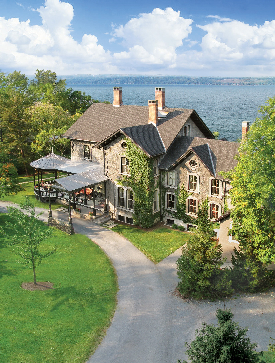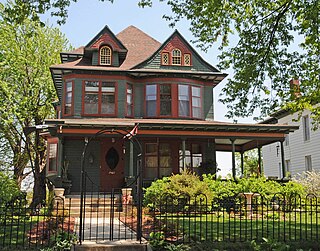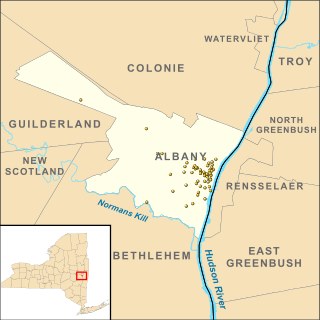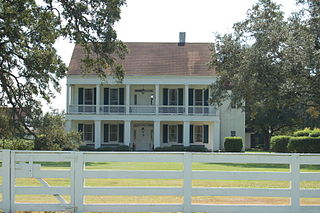
Druid Hills Historic District is a historic district in Druid Hills and Atlanta in DeKalb County, Georgia, United States, that is listed on the National Register of Historic Places (NRHP).

Rhodes Memorial Hall, commonly known as Rhodes Hall, is an historic house located in Atlanta, Georgia, United States. It was built as the home of furniture magnate Amos Giles Rhodes, proprietor of Atlanta-based Rhodes Furniture. The Romanesque Revival house occupies a prominent location on Peachtree Street, the main street of Atlanta, and is listed in the National Register of Historic Places. It is open to the public and has been the home of The Georgia Trust for Historic Preservation since 1983.

The Texas Governor's Mansion is a historic home for the governor of Texas in downtown Austin, Texas. Designed by prominent architect Abner Cook, it was built in 1854 and has been the home of every governor since 1856. Governor Greg Abbott and First Lady Cecilia Phalen Abbott are the current residents.
The Wyoming Governor's Mansion is the official residence of the governor of Wyoming. The current mansion was built during 1976 in Cheyenne.

The Leadville Historic District is in the mining town of Leadville, Colorado. The National Historic Landmark District includes 67 mines in the mining district east of the city up to the 12,000 foot level, and a defined portion of the village area. It was designated in 1961. Then, when the National Register of Historic Places (NRHP) program was started in 1966, Leadville's National Historic District was included in its first day's listings, along with all other existing National Historic Landmarks. The NRHP district was later expanded, adding a number of structures along the Harrison Avenue corridor, and making them eligible for historic preservation grants and tax subsidies, too.

The Herndon Home is a historic house museum and National Historic Landmark at 587 University Place NW, in Atlanta, Georgia. An elegant Classical Revival mansion with Beaux Arts influences, it was the home of Alonzo Franklin Herndon (1858-1927), a rags-to-riches success story who was born into slavery, but went on to become Atlanta's first black millionaire as founder and head of the Atlanta Life Insurance Company. The house was designed by his wife Adrienne, and was almost entirely built with African-American labor. The house was declared a National Historic Landmark in 2000, and had previously been declared a "landmark building exterior" by the city of Atlanta in 1989.

Joel Chandler Harris House, also known as The Wren's Nest or Snap Bean Farm, is a Queen Anne style house at 1050 Ralph D. Abernathy Blvd., SW. in Atlanta, Georgia. Built in 1870, it was home to Joel Chandler Harris, editor of the Atlanta Constitution and author of the Uncle Remus Tales, from 1881 until his death in 1908.

The E. B. Morgan House at 431 Main Street, Aurora, New York, was designed in the Italianate style by New York architect Joseph C. Wells for Edwin Barber Morgan, a wealthy entrepreneur and U.S. Congressman. Built between 1857 and 1858, the mansion expressed the new wealth of businessmen in Central New York. Their innovative companies had operations extending to California and the South. The mansion is a contributing property within the Aurora Village–Wells College Historic District, listed in 1980 on the National Register of Historic Places.

The Edward C. Peters House, also known as Ivy Hall, is a Queen Anne style house in Atlanta, Georgia. It occupies a lot covering an entire city block on the southeast corner of Piedmont Avenue and Ponce de Leon Avenue in Midtown Atlanta, just north of the SoNo neighborhood. Its current owner is the Savannah College of Art and Design.

The Rose Hill Historic District is a nationally recognized historic district located in Sioux City, Iowa, United States. It was listed on the National Register of Historic Places in 2002. At the time of its nomination it contained 217 resources, which included 132 contributing buildings 84 non-contributing buildings, and one non-contributing site. The district is located within the larger Rose Hill Addition, which was laid out by a group of Sioux City entrepreneurs in 1884. It includes many mansions built for the wealthy from about 1890 to 1910, most of which were later divided into apartments. The Elzy G. Burkam House (1894) and adjacent garage are contributing properties. It also included a 125-year-old house at 1529 Grandview Boulevard which was demolished in 2015 after a long controversy about historic preservation.

This is a list of National Register of Historic Places listings in New Haven, Connecticut.

There are 75 properties listed on the National Register of Historic Places in Albany, New York, United States. Six are additionally designated as National Historic Landmarks (NHLs), the most of any city in the state after New York City. Another 14 are historic districts, for which 20 of the listings are also contributing properties. Two properties, both buildings, that had been listed in the past but have since been demolished have been delisted; one building that is also no longer extant remains listed.

The Bona Allen Company is a tannery and leather goods factory that opened in 1873 in Buford, Georgia. It became the nation's largest producer of hand-tooled saddles, bridles, horse collars, postal bags, cowboy boots, and shoes and had a contract to supply the sporting equipment giant, Spalding, with raw material for the manufacture of baseballs and baseball mitts. Starting in the early 20th century Bona Allen saddles were offered in the Sears Mail Order catalog under a variety of names. The Bona Allen Company was owned by Bonaparte Allen Sr. Also known as the Bona Allen Shoe and Horse Collar Factory, the factory closed in 1981 after a fire, and the main tannery building was added to the National Register of Historic Places on January 3, 2005. It is located at 554 West Main Street. After another fire on February 10, 2015, firefighters allowed the building to burn itself down.
Carl Martel Neuhausen was an American architect based in Salt Lake City, Utah. He designed a number of buildings that survive and are listed on the U.S. National Register of Historic Places.

The George Taylor Jr. House is a historic house located at 187 North 400 West in Provo, Utah, United States. It is listed on the National Register of Historic Places.

The John R. Twelves House is a historic house located in Provo, Utah, United States. It is listed on the National Register of Historic Places.

Henry William Cleaveland was an American architect based in New York, New York, and then San Francisco, California, and Portland, Oregon. He was one of the founding members of the American Institute of Architects, and several of his works have been listed on the National Register of Historic Places. His works include Ralston Hall, a National Historic Landmark in the San Francisco Bay Area, the original Palace Hotel in San Francisco, and the Bidwell Mansion in Chico, California.

The John Quincy Allen House is a historic residence in Buford, Georgia. Its architectural style is described as Georgian Revival architecture. It was added to the National Register of Historic Places in 1984. It is located at 345 East Main Street.

Mulberry Grove is a historic mansion in Donaldsonville, Louisiana, U.S.. It was designed in the Greek Revival architectural style, and it was built in 1836 for Dr Duffel.

Haralson Bleckley was an American architect who designed many buildings in his hometown of Atlanta, Georgia. Several of his works are listed on the National Register of Historic Places (NRHP). His office was in the Flatiron Building. He also proposed the Bleckley Plaza Plan, a largescale architectural project that would have seen the creation of a large plaza in downtown Atlanta.




















